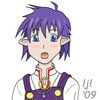| View previous topic :: View next topic |
| Author |
Message |
|
|
Animerican14
 Joined: 19 Aug 2006
Joined: 19 Aug 2006
Posts: 963
Location: Saint Louis, MO
|
 Posted: Sat Feb 26, 2011 12:52 am Posted: Sat Feb 26, 2011 12:52 am
|
 |
|
|
From what I've heard-- and I think I asked about this some weeks back-- the anime starts sometime in late middle school, yes? Or at least a bit later in the timeline than where the original manga began? Because I must've read about the first ten chapters a couple months ago, and... well... kinda forgot about it. Probably due to other time consuming things, as well as how I already had a lot of trouble keeping up with which character was which; some of them looked too much alike.
So for those having watched 6 episodes in.... does it feel like you've been able to keep up with the story as it is? Since, again, I believe it started a bit later in the timeline than the manga. Now, considering how it may be a bit too quiet and slow as a show, as beautiful and poignant as it may be, I'm kind of doubtful about watching it... but if I do, will the show be good enough to follow without having to worry about "what I missed" in the manga's opening chapters that I now largely forget? Or, given the relaxed place, does it already do enough to fill in on some earlier events?
|
| Back to top |
|
|
|
|
Fronzel
Joined: 11 Sep 2003
Posts: 1906
|
 Posted: Sat Feb 26, 2011 1:48 am Posted: Sat Feb 26, 2011 1:48 am
|
 |
|
| Quote: | | no one seems the least inclined to pull their briefs over their head and play Undie Man. |
Geez, they're a bit old for that.
|
| Back to top |
|
|
|
|
s.alsa-man1991
Joined: 24 Jan 2009
Posts: 137
|
 Posted: Sat Feb 26, 2011 2:33 am Posted: Sat Feb 26, 2011 2:33 am
|
 |
|
|
As pointed in the review, your potential enjoyment of this series can be estimated by how much you like indie drama.
So far, despite the extremely relaxed pace and musical direction, I'm enjoying it thoroughly. Perhaps, the series' only flaw is that it gathers way too many kids with gender issues under one classroom roof to be believable. But that can be overlooked, given how their interaction makes for a much more interesting story.
I don't know how it stacks up to the manga, however.
|
| Back to top |
|
|
|
Alexis.Anagram
 Joined: 26 Jan 2011
Joined: 26 Jan 2011
Posts: 278
Location: Mishopshno
|
 Posted: Sat Feb 26, 2011 3:01 am Posted: Sat Feb 26, 2011 3:01 am
|
 |
|
| Quote: | | The series doesn't truck with reductive ideas about gender identity disorders either. Nitori is no "girl in a boy's body." His behavior, particularly when playing BFFs with his similarly-inclined friend Mako, is plainly that of boy enacting a boy's ideal of girlishness, not a spontaneous expression of inborn femininity. |
Jumping right into the fray, I suppose, this is one of the many kinds of comments I feared would be incurred via the dialogue surrounding this show. “Reductive” ideas about gender identity disorders? What exactly is that supposed to mean? And the notion that Nitori’s gender expression directly connotes or even implies his gender identity is a sadly misinformed one; how Nitori chooses to (or feels he must) behave given the various social restrictions on his conduct as a “male” that he may have self-integrated has nothing to do with how he may or may not feel inwardly about his gender. Here’s something to ponder: what is “natural femininity”- a “spontaneous expression” as opposed to an “act”, an “ideal”? And what kinds of gender structures do you have to go about reinforcing in order to answer that question? In other words, if a girl were to do what Nitori does when he, as the reviewer would seem to imply, pretends to be a girl (because it is not integral to his self-image already?), would she be any less of a girl? Or is the implication that no girl would do what Nitori does, because it is not in a girl’s, erm, “nature”?
One of my (admittedly many) concerns with this series, the proverbial elephant in the room you could say (and I hate for it to be such a massive elephant because this is an indubitably beautiful and strongly characterized story) is that it’s nonetheless a story about transgender children told from the perspective of a cisgender author for a predominantly cisgender audience. Although it’s great at bringing up intriguing questions due to the subject matter alone, they are both being posed by and, in many respects, answered by the wrong demographic of society. Transgender issues, and the questions they bring to bear, are extremely complex and span everything from personal concerns surrounding the outward expression and internal identity of an individual to a greater ethical and practical gender conflict; issues surrounding the very idea of gender itself and how it is portrayed within society, any society, and how that influences the way people behave interpersonally, psychologically- you name it. I don’t know if the author herself has a clear grasp of the enormous nature of the beast that is trans culture, and as such I don’t know if she can maintain or even initiate an accurate or truly realistic perspective on the lives of transgender children-- who, in so many ways, are in even greater endangerment from conflicting hetero-normative ideologies than their adult counterparts. I would say the series has thus far failed to touch on this aspect of these childrens’ lives in anything more than a shallowly poetic sense; what Carl speaks of as Nitori and Takatsuki’s “realities” is, in my opinion, an emotionally overhauled curtailing of the true reality for most transgender kids their age, watered down to fit within the quiet, almost forced artistic subtlety of a story that is entirely too aware of the uncertainties of its creator and the paper thin ice it is resultantly made to tread.
I am still looking forward to following the series despite it all; if nothing else, Wandering Son is respectable for even attempting to foster serious interplay between transgender characters where most manga and anime write them off as mere comedy fuel or secondary cast members of little relevance. So, it’s already opened this door. At this point it’s a matter of hoping for the best.
(Incidentally, this is my first post here, and I’d like to say hi to everyone who takes the time to read it. Sorry it’s so long. And, er, hi!)
Last edited by Alexis.Anagram on Sat Feb 26, 2011 4:38 am; edited 1 time in total
|
| Back to top |
|
|
|
Player No. 3
 Joined: 21 Jan 2010
Joined: 21 Jan 2010
Posts: 209
Location: San Antonio, Texas
|
 Posted: Sat Feb 26, 2011 3:52 am Posted: Sat Feb 26, 2011 3:52 am
|
 |
|
| Alexis.Anagram wrote: | | (Incidentally, this is my first post here, and I’d like to say hi to everyone who takes the time to read it. Sorry it’s so long. And, er, hi!) |
And what a post it was. I quite enjoyed reading that.
Anyways, good review. I find that despite it's flaws, I'm falling in love with this series.
|
| Back to top |
|
|
|
Tamaria
 Joined: 21 Oct 2007
Joined: 21 Oct 2007
Posts: 1512
Location: De Achterhoek
|
 Posted: Sat Feb 26, 2011 4:05 am Posted: Sat Feb 26, 2011 4:05 am
|
 |
|
| Fronzel wrote: |
| Quote: | | no one seems the least inclined to pull their briefs over their head and play Undie Man. |
Geez, they're a bit old for that. |
Yeah, most kids are pretty serieus in the first few years after leaving elementary school. They're one big step closer to becoming adults and many feel they should act like it.
| Quote: | | Jumping right into the fray, I suppose, this is one of the many kinds of comments I feared would be incurred via the dialogue surrounding this show. “Reductive” ideas about gender identity disorders? What exactly is that supposed to mean? And the notion that Nitori’s gender expression directly connotes or even implies his gender identity is a sadly misinformed one; how Nitori chooses (or feels he must) behave given the various social restrictions on his conduct as a “male” that he may have self-integrated has nothing to do with how he may or may not feel inwardly about his gender. |
That bothered me as well. The definition of femininity is varies from culture to culture. For instance, in the Netherlands hockey is a typical sports for girls. Soccer is popular among boys and being a good soccer player is associated with masculinity. To many people not from here, that seems quite weird, because soccer is considered less rough and safer than hockey. When I was 12, there was a girl in my class who loved soccer. She was very good at it too. People expected her to behave like a boy because of it. The same people did not have the same expectations of the girls who liked and were good at hockey.
Or how about this, little girls are supposed to like pink, right? Less than onehunderd years ago light blue was the colour for little girls. It was associated with the virgin Mary. Pink was a colour for little boys, because it was like a lighter version of red, which is/was considered a masculine colour.
|
| Back to top |
|
|
|
Alexis.Anagram
 Joined: 26 Jan 2011
Joined: 26 Jan 2011
Posts: 278
Location: Mishopshno
|
 Posted: Sat Feb 26, 2011 5:12 am Posted: Sat Feb 26, 2011 5:12 am
|
 |
|
| Tamaria wrote: |
| Quote: | | Jumping right into the fray, I suppose, this is one of the many kinds of comments I feared would be incurred via the dialogue surrounding this show. “Reductive” ideas about gender identity disorders? What exactly is that supposed to mean? And the notion that Nitori’s gender expression directly connotes or even implies his gender identity is a sadly misinformed one; how Nitori chooses (or feels he must) behave given the various social restrictions on his conduct as a “male” that he may have self-integrated has nothing to do with how he may or may not feel inwardly about his gender. |
That bothered me as well. The definition of femininity is varies from culture to culture. For instance, in the Netherlands hockey is a typical sports for girls. Soccer is popular among boys and being a good soccer player is associated with masculinity. To many people not from here, that seems quite weird, because soccer is considered less rough and safer than hockey. When I was 12, there was a girl in my class who loved soccer. She was very good at it too. People expected her to behave like a boy because of it. The same people did not have the same expectations of the girls who liked and were good at hockey.
Or how about this, little girls are supposed to like pink, right? Less than onehunderd years ago light blue was the colour for little girls. It was associated with the virgin Mary. Pink was a colour for little boys, because it was like a lighter version of red, which is/was considered a masculine colour. |
Good points. However, more towards what I was trying to clarify and a concept which I feel is essential to understanding transgender philosophy on the whole (and keep in mind this is a HUGE generalization and I'm sure many transgender people, particularly those that choose to identify within a binary system, might disagree with) is that for that exact reason, gender and any aspect of gender CAN NOT be defined by a society or culture; or, for that matter, any entity or collective external to the individual adopting that identity. Because gender is such an intimate and personal quality, one can not clearly and objectively dictate a set boundary for what constitutes femininity or masculinity, male or female, man or woman. In Nitori's case, evaluating his (or her) actual gender as "really male" or, at the very least, "not really female" pursuant to his particular mode of outward feminine identity as though it mismatches with some imagined segregation of gender qualities isn't valid because he is expressing himself as best he can, as he is comfortable and most importantly, as he knows himself to be. Gender, and all matters therein, are decided by the person whose gender is being called into question; NOT by those who would call that person's gender into question. The first episode rather sheepishly indicates this conflict by asking the viewer, "What are girls made of?" but falls short of providing this extremely important backdrop from the outset. The answer is simple: girls decide what girls are made of on an individual basis, regardless of whether or not the rest of the world recognizes them as such.
|
| Back to top |
|
|
|
jojothepunisher
 Joined: 04 Sep 2007
Joined: 04 Sep 2007
Posts: 799
|
 Posted: Sat Feb 26, 2011 7:53 am Posted: Sat Feb 26, 2011 7:53 am
|
 |
|
|
I stopped watching it after 3 episodes, because there are just basically nothing happening in the show.
|
| Back to top |
|
|
|
teferi
 Joined: 16 May 2006
Joined: 16 May 2006
Posts: 400
|
 Posted: Sat Feb 26, 2011 9:55 am Posted: Sat Feb 26, 2011 9:55 am
|
 |
|
| Quote: | | gender and any aspect of gender CAN NOT be defined by a society or culture |
Lets be honest, if that were true we wouldn't have this show. Nitori's primary problem is that his crossdressing ( a whole word dedicated to showing that society decides what defines a gender) is considered wrong because he is male (as in he has male genitalia). You can rant about feelings as to whether one is male or female, but society is pretty much set in it's ways about this and that is the issue Wandering Son is trying to deal with.
@review: I think the whole idea of how grown up the kids are is a bit overblown. As far as relationships you'd be surprised how far kids get by middle school. Otherwise it's pretty spot on, the scripting is pretty confusing but it looks so damn good and adapts the general gist of the manga that it's hard to care.
Last edited by teferi on Sat Feb 26, 2011 9:58 am; edited 1 time in total
|
| Back to top |
|
|
|
vashfanatic
 Joined: 16 Jun 2005
Joined: 16 Jun 2005
Posts: 3502
Location: Back stateside
|
 Posted: Sat Feb 26, 2011 9:58 am Posted: Sat Feb 26, 2011 9:58 am
|
 |
|
|
@Alexis.Anagram
And as we talk about gender in terms of it being either socially or individually defined, can we not say the same thing about transexuality and trans culture? I was recently reading a book on the travestí in Brazil, who by our definitions would be "trangender" given the amount of surgery they go through, but by their own definition they are male homosexuals and "wanting to be female" would make you be crazy. How "trans" do you have to be to be "trans"? Where is the boundary between cisgendered and transgendered? Is the category a Western creation, a manifestation of our own gender values to begin with?
I make no claims to be an expert, and I may be using terms incorrectly, in which case I apologize, but especially when talking about a show created in another country, the levels of complexity at least double. And don't forget that within this series it's not just Nitorin, it's Takatsuki and Mako and their adult friend Yuki (and her live-in boyfriend; is he gay or straight? is it even that simple?).
And as an add on, given the context I love your icon!
|
| Back to top |
|
|
|
|
Parsifal24
|
 Posted: Sat Feb 26, 2011 11:27 am Posted: Sat Feb 26, 2011 11:27 am
|
 |
|
|
I wish I could work up some kind of entushiasm about this sereis but I just dont care dont hate it dont like it I'm just ambivlent as a whole wish it well. but I wont be watching and I think noteing the uralistic maturity of a number of the charcters was a good point.
|
| Back to top |
|
|
|
|
soft-n-fluffy
Joined: 30 Sep 2010
Posts: 25
|
 Posted: Sat Feb 26, 2011 12:44 pm Posted: Sat Feb 26, 2011 12:44 pm
|
 |
|
|
Great review for a great show. I've been enjoying it very much so far. Though I must admit, as a fan of social drama, I've been secretly hoping for some more straight-up drama, like when Maho discovered Nitori's habit.
|
| Back to top |
|
|
|
PingSoni
 Subscriber
 Joined: 05 Dec 2008
Joined: 05 Dec 2008
Posts: 196
Location: Lansing MI
|
 Posted: Sat Feb 26, 2011 2:13 pm Posted: Sat Feb 26, 2011 2:13 pm
|
 |
|
|
I've only watched enough of the Crunchyroll stream to affirm my decision to import the series (not that I had much doubt, as I really love Aoi Hana and assumed that Houro Musuko would have similar production values). I do own the 11 published volumes of the manga.
Most manga artists tell stories that transcend their personal experiences, and I'm happy that they do so. The works I've read by Shimura I value because of their focus on the emotional side of relationships and their portrayal of the fragile web of assumptions about each other we negotiate in trying to figure out who we are and how we should behave and what the consequences of our actions will be.
I'm not sure that anyone truly knows what gender is or is ever completely comfortable with their own ever-changing experience of and presentation of gender. I welcome any story that treats that as serious subject matter.
The last thing in the world I would want to read as manga or watch as anime is some politicized rant about what it means to be queer or trans. That's not entertainment, and I've had all of that I can stand in the real world.
Middle school is a time when many important issues must be considered. I sure as heck thought a lot about this subject in middle school.
|
| Back to top |
|
|
|
Alexis.Anagram
 Joined: 26 Jan 2011
Joined: 26 Jan 2011
Posts: 278
Location: Mishopshno
|
 Posted: Sat Feb 26, 2011 2:16 pm Posted: Sat Feb 26, 2011 2:16 pm
|
 |
|
| teferi wrote: |
| Quote: | | gender and any aspect of gender CAN NOT be defined by a society or culture |
Lets be honest, if that were true we wouldn't have this show. Nitori's primary problem is that his crossdressing ( a whole word dedicated to showing that society decides what defines a gender) is considered wrong because he is male (as in he has male genitalia). You can rant about feelings as to whether one is male or female, but society is pretty much set in it's ways about this and that is the issue Wandering Son is trying to deal with. |
Yet the conflict (and central thematic element) within this show is actually a result of what the kind of queer theory I was citing just now attempts to disperse. If everyone would simply accept Nitori's gender for what it is, rather than trying to force a particular gender perspective that casts him in a singular, definitively "male" role, his life would be a whole lot easier. The problem for many transgender people is that society TRIES to create this system for identification, but it's always based in rote stereotypes and false, generally extremely sexist, notions as to what composes man and woman behaviorally, emotionally, psychologically and, at its most base form, physically. Simply because Nitori has male genitalia does NOT mean that he isn't female- this is exactly what gender dysphoria describes and it's why I was surprised that Carl chose to dismiss it as "reductive" as if it would be overly simplistic or irrelevant despite the fact that it's a perfectly legitimate view of his condition.
| vashfanatic wrote: | | @Alexis.Anagram
And as we talk about gender in terms of it being either socially or individually defined, can we not say the same thing about transexuality and trans culture? I was recently reading a book on the travestí in Brazil, who by our definitions would be "trangender" given the amount of surgery they go through, but by their own definition they are male homosexuals and "wanting to be female" would make you be crazy. How "trans" do you have to be to be "trans"? Where is the boundary between cisgendered and transgendered? Is the category a Western creation, a manifestation of our own gender values to begin with?
I make no claims to be an expert, and I may be using terms incorrectly, in which case I apologize, but especially when talking about a show created in another country, the levels of complexity at least double. And don't forget that within this series it's not just Nitorin, it's Takatsuki and Mako and their adult friend Yuki (and her live-in boyfriend; is he gay or straight? is it even that simple?).
And as an add on, given the context I love your icon! |
Well, naturally. The core concept behind the gender theory I posed is that people define their own gender; a cisgender person is simply someone who identifies comfortably within their own socially attributed sex, whereas a transgender person is someone who resists that portrayal on any level in favor of their own (the terms may be more reactionary than descriptive; certainly, the word "transgender" is extremely vague and can describe any of a wide range of gender statuses, but this is another conversation entirely). A transsexual is someone who specifically desires or achieves a change of physical gender. A cross-dresser is a self-identifying person of a singular gender who dresses in the "opposite" sex's clothing (i.e. Nitori, in desiring to be female, isn't really a cross-dresser because he's wearing the correct clothes for the gender he feels he should be). In all of these cases, it's a matter of purely personal identification: I would never think to tell someone what they are, or to deny that they're anything except for what they say they are. In the case of the Brazilian tribe, if they describe themselves as male homosexuals than that is what they are- there's no requisite debate at hand here, there's no reason to question it. Transgender theory is only really difficult to grasp if you have in mind a fixed constitution as to what a man or woman is; if you accept that everyone is experiencing gender on their own terms, then it's really easy to see people as, first and foremost, people- not a subject of their physical body nor of sexually charged societal expectations.
(OFFTOPIC) Thanks for pointing out my icon. 
Despite the fact that she fits securely within that "irrelevant secondary character" position I mentioned before, I really like Peppo and am actually going to be cosplaying her at a lolita social today if I can get off the computer and get ready! <.<;
|
| Back to top |
|
|
|
|
Zhou-BR
Joined: 28 Feb 2008
Posts: 1474
|
 Posted: Sat Feb 26, 2011 5:26 pm Posted: Sat Feb 26, 2011 5:26 pm
|
 |
|
|
I'd just like to point out that "travesti" are not a tribe. It's simply the Portuguese word for "transvestite". The only tribes we have in Brazil are in Indian reservations.
|
| Back to top |
|
|
|
|
 Subscriber
Subscriber